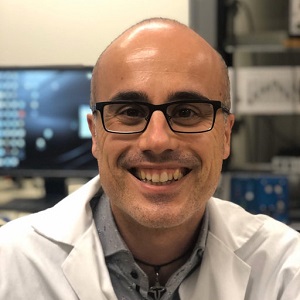
Meet the Dsf scientist series: Stefano Comai
 |
Stefano has been recently appointed as a tenure-track researcher (RTDb) at DSF
________________________________________
Tell us about yourself: what is your educational and academic background?
I received a degree in Pharmacy (2003) and a PhD in Pharmaceutical Sciences (2007) at the University of Padua, Padua, Italy. I then remained as a post-doc until 2009 when I moved to the Department of Psychiatry at McGill University, to continue my research as a post-doc in the Neurobiological Psychiatry Unit headed by Prof. G. Gobbi. After 6 years and half of postdoctoral experience at McGill University, in October 2015, I moved back to Italy to start my independent career as Assistant Professor of Pharmacology at the San Raffaele Vita-Salute University in Milan. However, I have manteined my scientific collaboration with McGill University in which I was appointed as Adjunct Professor in December 2017. In October 2020, I returned to the University of Padua with a tenure-track position as Assistant Professor of Pharmacology.
…………………………………………………………………………………………..
Can you summarize in few words your research?
The major aim of my research is to enhance the understanding of the neurobiology and psychopharmacology of mood disorders and comorbidities in order to 1) develop novel therapeutic drugs with hypnotic, anxiolytic, analgesic or antidepressant activity, and 2) discover possible novel pharmacological targets for treating mood disorders. In particular, since my PhD training, I have been focusing my studies on the serotonergic and melatonergic systems that share the same precursor, the amino acid tryptophan, to determine the extent to which these metabolically connected systems are involved in the pathophysiology and treatment of depression, anxiety, aggression and insomnia. Moreover, within this context, I recently started to expand my interests to the endocannabinoid system and its relationship with the serotonergic system, and the use of psychedelics, particularly LSD, at low and non-hallucinogenic doses for treating mood disorders. In my lab, these scientific goals are achieved through a translational approach spanning from in-vitro to in-vivo preclinical and clinical neuropsychopharmacology, thus allowing findings to be moved from the researcher’s bench to the patient’s bedside and community.
…………………………………………………………………………………………..
What is the most challenging part of your work?
In this period, one of the most challenging part of my work is to find a good work–life balance. Having recently moved to the University of Padua but still keeping my activities in Milan at the San Raffaele Institute and in Canada at McGill University, very often it becomes challenging to find enough hours in the day to maintain both a career and a personal life. The problem is that being on the track of new discoveries, it becomes almost obsessive, and it’s difficult to understand when it is time to stop and dedicate some time to extra-work activities.
More in general, the other very challenging part of my work that I believe can be shared with the majority of the colleagues, is the hardness of getting funds to support my research projects and consequently my lab daily activities. Unfortunately, in Italy we are facing a time in which funding for research is very low, and the competition among qualified researchers for these limited resources is very high. Since I became an independent investigator 5 years ago, I have spent a lot of my time preparing and submitting multiple state-of-the-art applications to advance the field of the neuropsychopharmacology of mood disorders and comorbidities. Although many of these projects have received a good evaluation in terms of the underlying science and future perspectives for the field, only few has been funded because of lack of resources. A good idea is thus no guarantee of grant success. This is very frustrating, disappointing, and discouraging, but it is a part of the work I have to cope with as a researcher.
…………………………………………………………………………………………..
What is the most satisfying part of your work?
There are many aspects to consider that make my work as an academic scientist very satisfying. I have certainly to mention the freedom to choose my research topics and goals along with the possibility of scheduling my daily work with quite high flexibility. Research can be very demanding and in certain periods can take the most of my time, but when my initial idea/hypothesis is first funded, and then the results of the research are in line with the expectations and acknowledged by the scientific community, this is the most rewarding moment of my work.
Another satisfying part of my work is the possibility of travelling all around the world for scientific conferences but also to meet peers with whom I can discuss of new projects and collaborations, and have important feedback on my research.
Last but not least important satisfying part of my work is the possibility to mentor students and the new generation of researchers. After spending a considerable part of my time teaching them how to perform the different experiments in the lab and how to interpret and to discuss their findings, it is a real fulfilment when I realize that I have transmitted them the passion for scientific research, and they are starting to become independent in pursuing their scientific project.
…………………………………………………………………………………………..
What are your outside hobbies?
Out of science, I love playing and listening music (I play the keyboard) and to do sport on a daily basis (my favourite sports are bike, ski and hike). In addition, I love travelling and discovering new places and cultures.
.…………………………………………………………………………………………..





